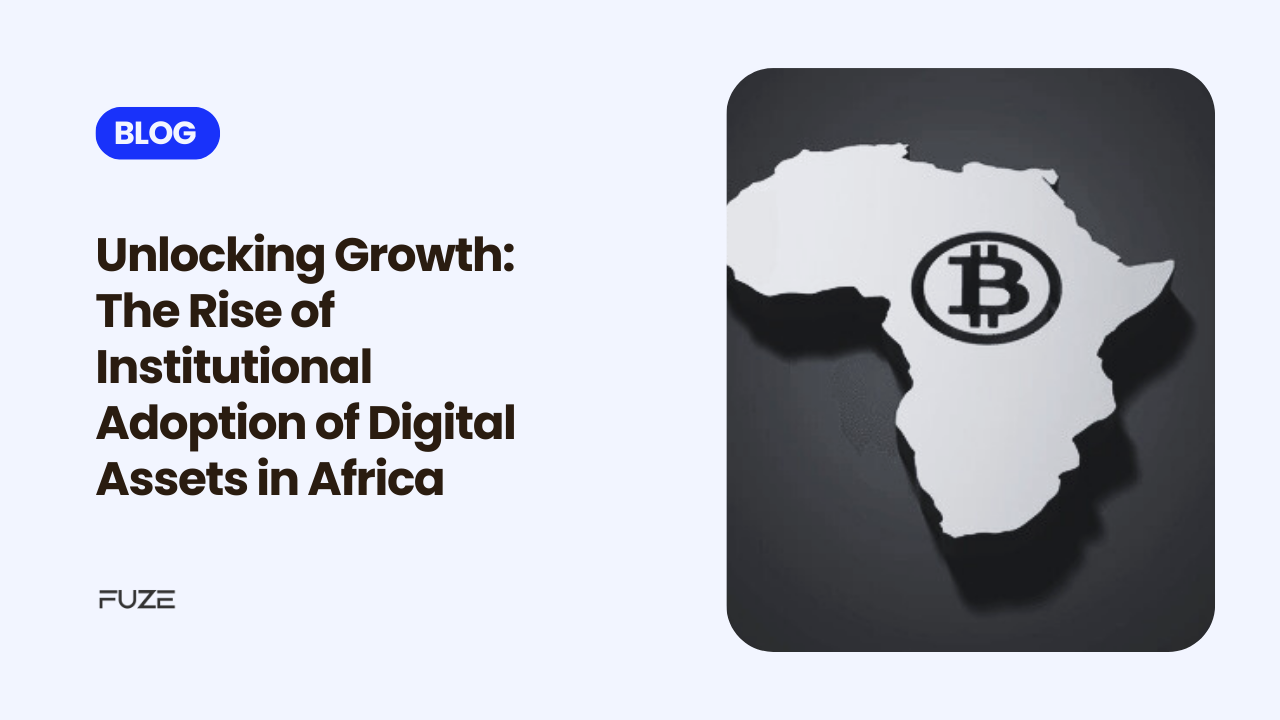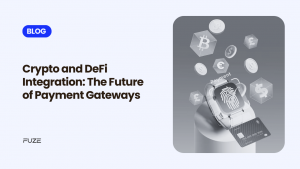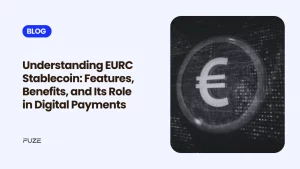Over the past few years, Africa has been witnessing a critical shift in the way institutions look at and relate to digital assets. This change is becoming ever more crucial with more institutional players exploring blockchain technology and cryptocurrency for the potential to improve their business operations, diversify portfolios, and access new financial markets. Africa, known for its innovation and rapid growth in financial services, is now fast becoming a significant player in the global digital asset movement.
This blog discusses why institutional adoption of digital assets is on the rise in Africa, what’s fueling it, and the key challenges and opportunities that the continent’s financial ecosystem are likely to face.
The Growing Interest in Digital Assets Across Africa
Historically, the African continent has been a hotbed for financial innovation. Mobile money services, such as M-Pesa in Kenya, have helped revolutionize access to financial services, enabling millions of people who were previously excluded from traditional banking systems to access mobile-based payments and savings. This innovation-driven mentality is now extending to the digital asset space, where Africa is emerging as a major player.
Several factors have contributed to the surge in institutional adoption of digital assets in Africa. Let’s take a closer look at the key drivers behind this trend.
- Portfolio Diversification
Economic instability and inflation in addition to fluctuations of currencies are problems with which Africa has been long bothered, making it more difficult for investors to secure long-term wealth. In view of these, most institutional investors are now resorting to digital assets as an alternate way to diversify their portfolios to hedge risks associated with financial markets.
Digital assets, such as Bitcoin and Ethereum, are appealing because they operate independently of central banks, which makes them a potential safe haven during times of economic uncertainty. For instance, given that the local currencies of Nigeria have significantly been devalued, many investors seek investing in cryptocurrencies as a store of value and a means to protect their assets against inflation.
As blockchain technology matures and cryptocurrency continues to gain mainstream recognition, institutional investors are becoming more confident in integrating digital assets into their investment strategies. This includes private equity firms, hedge funds, and even traditional banks, which are now considering digital assets as part of their investment portfolios.
- Access to a Growing Global Market
Africa’s growing adoption of digital assets is closely linked to its access to a broader global market. With more African investors and institutions embracing cryptocurrencies, there is an increasing demand for global solutions that can connect African financial markets with international counterparts.
Digital assets are global by design, so they can be traded and transferred across borders without the restrictions imposed by traditional financial systems. It makes it easier for African institutions to access international markets, reduce transaction costs, and engage in cross-border trade without relying on banks or traditional intermediaries.
African institutions can tap into a network of global liquidity by adopting blockchain technology and digital assets, which allows them to diversify and grow their investments with more freedom. This is particularly important for businesses and financial institutions that operate across multiple countries within Africa, as the seamless nature of blockchain technology can help reduce the complexities of cross-border transactions.
- Innovation in Financial Services
There is also an increased need for innovation in the financial services sector. Digital assets, driven by blockchain technology, are changing the nature of traditional banking systems. Digital assets provide payment solutions that simplify the payment process, cut down costs, and make transactions more transparent. They also offer a solution for African institutions seeking innovation in their operations and to stand out from their peers.
One such innovation is CBDCs. Several governments have considered CBDCs with the aim of digitizing their national currencies, increasing financial inclusion and improving the efficiency of monetary systems. So far, most countries are at the pilot or research stage; however, they are perceived to be the newest opportunity for African institutions to utilize blockchain technology in a regulatory environment.
Moreover, it will provide institutions in Africa with the opportunity of accessing financial services through decentralized finance platforms without dependence on traditional banking systems. As DeFi would remove intermediaries, it lowers transaction fees and accelerates processing times, as well as offers African financial institutions the opportunity for innovation and delivering services to unbanked populations hitherto unreachable.
- Regulatory Developments and Institutional Frameworks
As digital assets gain traction, many African governments and regulatory bodies are beginning to put frameworks in place to ensure that these assets are integrated safely into the financial ecosystem. Countries like South Africa, Nigeria, and Kenya are making strides in defining regulations for cryptocurrency trading, and financial institutions are adapting to these changes.
There are still a number of reasons why regulatory clarity would facilitate institutional adoption: it helps alleviate risk and ensure compliance with local laws. In Nigeria, for example, where regulatory uncertainty has usually slowed the speed of digital asset adoption, recent government actions have created a space in which institutions feel less apprehensive to enter the market. For example, Nigeria recently adopted a less restrictive approach towards blockchain and cryptocurrency, setting out rules for how banks and other financial institutions can deal with digital assets in a regulated order. This regulatory push is helping to build trust among institutions and investors, providing a secure framework within which digital assets can be traded and used.
- Increasing Financial Inclusion
One of the most promising aspects of digital asset adoption in Africa is the potential to enhance financial inclusion. Traditional banking systems in Africa still leave many individuals and businesses without access to basic financial services.
Digital assets, particularly cryptocurrencies, have the potential to bypass the traditional banking system and provide people with secure financial services through smartphones and the internet. With more institutions embracing these technologies, they are helping bridge the gap between the unbanked and the financial system.
Institutional adoption is also driving innovations in new payment systems and wallets that allow ease in access to digital currencies, cross-border transactions, and reduce cash reliance. This increases financial inclusion among the masses and businesses as they can connect with the global economy better.
Challenges in Institutional Adoption
Nevertheless, despite the drastic growth in institutions embracing digital assets in Africa, there are aspects that need mitigation.
- Volatility and Risk
Cryptocurrencies are known for their volatility, and this remains a concern for many institutional investors. More often than not, these fluctuations in value of the prices cause uncertainty and make it difficult for institutions to manage their risks appropriately. This can only be addressed by institutions developing strategies for managing risk that account for the volatility of digital assets while still allowing them to earn the rewards.
- Limited Regulatory Clarity
Though the regulatory landscape is shifting, most African nations do not yet have explicit rules for digital assets. Without well-defined rules, institutions may hesitate to fully embrace digital assets due to potential legal risks. Ensuring that regulations are clear and supportive will be essential for fostering continued growth in this sector.
- Technological Infrastructure
The adoption of blockchain and digital asset technologies requires a certain level of infrastructural development, including secure digital wallets, exchanges, and other technical solutions. Some African countries may face challenges in developing and implementing these technologies, especially in regions where access to the internet and technology is still limited.
The Road Ahead: Unlocking Potential
This is just the beginning of institutional adoption of digital assets in Africa. As the continent continues to invest in financial infrastructure and regulatory frameworks, digital assets will play an increasingly significant role in shaping the future of African economies.
For African financial institutions, the opportunities are vast. By adopting digital assets, institutions can enhance their financial offerings, reduce costs, and tap into new markets. For governments, the potential to drive financial inclusion and create more resilient financial systems is also immense.
The next few years will likely see continued growth in institutional adoption, and with the right policies, technology, and infrastructure, Africa has the potential to lead the world in the digital asset revolution.
Conclusion
Africa is quickly emerging as a hub for institutional adoption of digital assets, driven by factors such as diversification of investment portfolios, access to global markets, and the demand for innovation in financial services. This trend, despite its challenges with regard to volatility, regulatory clarity, and infrastructure, represents a tremendous opportunity for unlocking growth, financial inclusion, and economic development on the continent. With this outlook, the future seems promising, and Africa is well on its way to becoming a global leader in the digital asset space.
Disclaimer: Virtual assets carry significant risks, including high volatility and potential loss of your entire investment. They are not backed by governmental protections, and recourse may be limited in case of loss. Always assess your risk tolerance, fully understand the risks, and seek independent financial advice if needed before investing.
Frequently Asked Questions
1. How does digital asset adoption benefit African financial institutions?
African financial institutions can benefit from digital asset adoption by reducing transaction costs, enhancing transparency, improving cross-border payment efficiency, and tapping into the global liquidity pool through decentralized finance (DeFi) platforms.
2. What regulatory challenges are hindering the growth of digital assets in Africa?
Despite the increasing interest in digital assets, many African countries still lack clear, comprehensive regulations. This regulatory uncertainty poses a risk for institutional investors and slows down the full integration of digital assets into mainstream financial systems.
3. What are the risks associated with institutional adoption of digital assets in Africa?
The primary risks include the volatility of digital assets, potential security threats such as hacks or fraud, and regulatory uncertainty. Additionally, institutions may face challenges in integrating digital assets with existing financial infrastructure.
4. How can African governments and regulators support digital asset adoption?
Governments and regulators can foster adoption by creating clear, supportive regulatory frameworks, promoting blockchain education, and developing digital infrastructure that enables secure and efficient access to digital assets. Encouraging innovation while ensuring financial stability will be key.
5. What is the future outlook for digital asset adoption in Africa?
The future of digital asset adoption in Africa looks promising. With continued regulatory developments, advancements in financial infrastructure, and the growing recognition of the benefits of blockchain technology, digital assets will play an increasingly important role in transforming Africa’s financial landscape.







